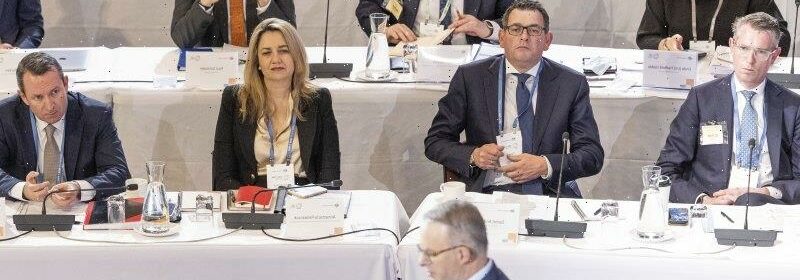Bargaining bombshells and billion-dollar TAFE boosts: The takeaways from day one of the jobs summit

Prime Minister Anthony Albanese kicked off the national jobs and skills summit in Canberra by urging attendees not to “dig deeper trenches on the same old battlefields” but to try to strive for common goals.
“Compromises will need to be negotiated, sacrifices will need to be made. If we can get it right, if we can seek out points of consensus … the results will certainly be worth it,” he said.
State premiers listen to the prime minister’s opening address.Credit:Alex Ellinghausen
Here are the key takeaways from day one:
- Employment and Workplace Minister Tony Burke announced plans to legislate easier multi-employer wage deals, alarming key business groups who warned it could lead to industry-wide strikes.
- The “better off overall test”, which ensures employees don’t go backwards under enterprise agreements, will be simplified, and more flexibility introduced for parental leave arrangements.
- A construction industry forum to oversee worker welfare will be established once the controversial Australian Building and Construction Commission is abolished.
- An extra 180,000 fee-free TAFE places will be created across the country from next year, in a $1.1 billion agreement between the federal, state and territory governments.
- Victorian Premier Daniel Andrews called for improved access to childcare to boost women’s workforce participation, although the federal government has so far resisted bringing forward its expansion of cheaper childcare from July 1 next year.
- Australian of the Year Dylan Alcott said allowing people with a disability to pick up more work hours without losing their disability support pension would be a “no-brainer”, noting of the nearly 4.5 million people living with disability in Australia only 54 per cent were in the workforce – a participation rate that has not changed in 28 years.
- Australia’s Chief Scientist Dr Cathy Foley said the country needs to get more women and girls into science and maths, suggested vocational training for STEM careers and a technology apprenticeship program, and noted career researchers in the tertiary sector have high levels of job insecurity.
- Clean Energy Council chief executive Kane Thornton said the federal government’s plan to reach 82 per cent clean energy in the electricity grid by 2030 could generate an additional 600,000 jobs.
- Australia could go from its current economic funk to a prosperous global leader in the energy transition, eminent economist Professor Ross Garnaut said in his keynote speech that challenged the leaders to capitalise on the country’s “five crucial advantages”.
Illustration: Matt GoldingCredit:
Cut through the noise of federal politics with news, views and expert analysis from Jacqueline Maley. Subscribers can sign up to our weekly Inside Politics newsletter here.
Most Viewed in Politics
Source: Read Full Article

